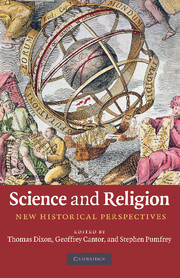Book contents
- Frontmatter
- Contents
- List of contributors
- Preface
- 1 Introduction
- PART I CATEGORIES
- PART II NARRATIVES
- PART III EVOLUTION AND CREATIONISM
- PART IV THE POLITICS OF PUBLISHING
- PART V WAYS FORWARD
- 12 Sciences and religions: what it means to take historical perspectives seriously
- 13 Simplifying complexity: patterns in the history of science and religion
- 14 What shall we do with the ‘Conflict Thesis’?
- Select bibliography
- Index
14 - What shall we do with the ‘Conflict Thesis’?
Published online by Cambridge University Press: 05 May 2010
- Frontmatter
- Contents
- List of contributors
- Preface
- 1 Introduction
- PART I CATEGORIES
- PART II NARRATIVES
- PART III EVOLUTION AND CREATIONISM
- PART IV THE POLITICS OF PUBLISHING
- PART V WAYS FORWARD
- 12 Sciences and religions: what it means to take historical perspectives seriously
- 13 Simplifying complexity: patterns in the history of science and religion
- 14 What shall we do with the ‘Conflict Thesis’?
- Select bibliography
- Index
Summary
INTRODUCTION
John Rutty, a Dublin apothecary, maintained a diary for some twenty years, beginning in 1753. Every day he reflected on the state of his soul and the religious significance of his various experiences. We know a great deal about the state of Rutty's soul because in 1776, the year after his death, a number of his fellow Quakers published his diary under the title A spiritual diary and soliloquies. The Spiritual diary is a fascinating document which provides the historian with an entrée into the intimate religious thoughts and feelings of an eighteenth-century Quaker. We also know that Rutty had a thriving medical practice and published works on gallstones, on mineral waters, on the weather, and on the natural history of Dublin, and he even wrote a materia medica. For the historian of science and religion what is most striking is the large number of entries in which Rutty exposed his deep ambivalence about his pursuit of medicine and science. The following three diary entries characterize his attitude to science and medicine:
Physick is less precious in my view, having for its object the welfare of the mortal body only: Lord, raise up the medicina mentis [the medicine of the soul].
Lord, remember not the sin of my youth and age, even that of idolizing nature! O give me now to redeem the time, the precious time!
Now is the snare laid in natural science: Lord, grant that it may be in vain!
In these and many similar passages, which are loaded with biblical resonances, we see Rutty assailed by inner conflict as he was repeatedly pulled between the opposing poles of the pursuit of science and of the pure spiritual life.
- Type
- Chapter
- Information
- Science and ReligionNew Historical Perspectives, pp. 283 - 298Publisher: Cambridge University PressPrint publication year: 2010
- 10
- Cited by

